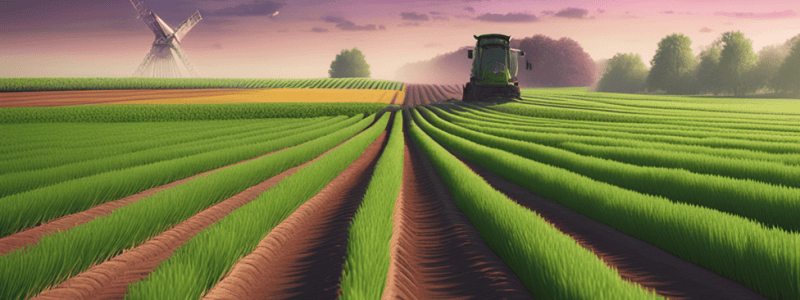Podcast
Questions and Answers
பயிற்சிகளை பெறுவதற்கு அதிக செயல்படுத்தப்படும் நிலம் என்ன?
பயிற்சிகளை பெறுவதற்கு அதிக செயல்படுத்தப்படும் நிலம் என்ன?
நீர் ஆதாரத்தைப் பாதுகாக்க கருதப்படும் நிலம்
பயிற்சி உத산ங்களை நிலநிறையை மேற்கொள் பாதுகாக்கும் துணைகள் என்ன?
பயிற்சி உத산ங்களை நிலநிறையை மேற்கொள் பாதுகாக்கும் துணைகள் என்ன?
உமம்கள்
பயிற்சி மாற்றம் என்ன?
பயிற்சி மாற்றம் என்ன?
பயிற்சிகளை மாற்றவும் மாற்றத்தை மாற்றுகிறது.
Flashcards are hidden until you start studying
Study Notes
Crop Production and Management: Exploring Crop Rotation and Its Benefits
Crop production and management is a crucial aspect of agriculture, encompassing practices that ensure efficient land use, environmental sustainability, and optimum crop yields. In this article, we'll unravel the concept of crop rotation and its significance in modern farming.
Crop Rotation Crop rotation is the practice of growing different crops in a specific order on the same field each year, rather than growing the same crop repeatedly. This is done to maintain soil health, minimize pests and diseases, optimize nutrient availability, and enhance long-term productivity.
Benefits of Crop Rotation
- Soil Health and Fertility: Rotating crops helps to improve soil structure, organic matter, and nutrient levels. Legumes, for example, can fix nitrogen from the atmosphere, reducing the need for fertilizers. Root crops like potatoes and carrots break up compacted soil and improve aeration, while crops like wheat and corn provide residues that prevent soil erosion.
- Pest and Disease Management: Crop rotation disrupts the life cycle of pests and diseases, preventing them from building up in large numbers. For instance, nematodes that target legumes are unlikely to be present in fields where they haven't been grown in several years. Similarly, crops with different growth habits can disrupt the cycles of pests and diseases.
- Water Efficiency: Crop rotation can help to maintain soil moisture in arid conditions. Crops with deep root systems, like alfalfa, can extract water from deeper soil layers, leaving water accessible to shallow-rooted crops like wheat or corn the following year.
- Crop Yield and Quality: Well-planned crop rotations can mean healthier plants, better yields, and more nutritious produce. For example, corn grown after a legume crop like soybeans or peas can benefit from the nitrogen fixed by the legumes, resulting in higher yields.
- Reduced Environmental Impact: Crop rotation can reduce the need for chemical inputs, such as fertilizers and pesticides. It can also help to reduce soil erosion and water pollution, protecting nearby ecosystems and water bodies.
Crop Rotation Planning
Planning a crop rotation requires careful consideration of several factors, including:
- Soil Nutrient Levels: Ensuring that crops are grown in the right order to maintain or improve soil fertility is crucial. A legume crop, for example, can help to restore soil nitrogen levels before a nitrogen-demanding crop like corn is grown.
- Climate: Different crops have different water and temperature requirements. A crop rotation plan should take into account the local climate and provide crops that can thrive in it.
- Market Demands: Crop rotation should also take into account market demands and consumer preferences. Rotating crops ensures that farmers can produce a variety of crops that meet consumer needs and provide reliable income.
- Pest and Disease Management: A crop rotation plan should include crops that disrupt the life cycles of pests and diseases. For instance, a grain crop like wheat can be grown after a legume crop like peas, helping to reduce the risk of diseases like powdery mildew in the following year.
In conclusion, crop rotation plays a vital role in maintaining soil health, promoting long-term productivity, and reducing the environmental impact of modern farming. By carefully planning a crop rotation, farmers can improve soil fertility, reduce the need for chemical inputs, and produce a variety of crops that meet consumer needs.
Studying That Suits You
Use AI to generate personalized quizzes and flashcards to suit your learning preferences.




